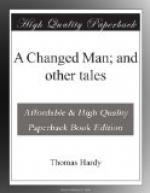July 15.—A letter from Caroline to-day. It is very strange that she tells me nothing which I expected her to tell—only trivial details. She seems dazzled by the brilliancy of Paris—which no doubt appears still more brilliant to her from the fact of her only being able to obtain occasional glimpses of it. She would see that Paris, too, has a seamy side if you live there. I was not aware that the Marlets knew so many people. If, as mother has said, they went to reside at Versailles for reasons of economy, they will not effect much in that direction while they make a practice of entertaining all the acquaintances who happen to be in their neighbourhood. They do not confine their hospitalities to English people, either. I wonder who this M. de la Feste is, in whom Caroline says my mother is so much interested.
July 18.—Another letter from Caroline. I have learnt from this epistle, that M. Charles de la Feste is ’only one of the many friends of the Marlets’; that though a Frenchman by birth, and now again temporarily at Versailles, he has lived in England many many years; that he is a talented landscape and marine painter, and has exhibited at the Salon, and I think in London. His style and subjects are considered somewhat peculiar in Paris—rather English than Continental. I have not as yet learnt his age, or his condition, married or single. From the tone and nature of her remarks about him he sometimes seems to be a middle-aged family man, sometimes quite the reverse. From his nomadic habits I should say the latter is the most likely. He has travelled and seen a great deal, she tells me, and knows more about English literature than she knows herself.
July 21.—Letter from Caroline. Query: Is ’a friend of ours and the Marlets,’ of whom she now anonymously and mysteriously speaks, the same personage as the ‘M. de la Feste’ of her former letters? He must be the same, I think, from his pursuits. If so, whence this sudden change of tone? . . . I have been lost in thought for at least a quarter of an hour since writing the preceding sentence. Suppose my dear sister is falling in love with this young man—there is no longer any doubt about his age; what a very awkward, risky thing for her! I do hope that my mother has an eye on these proceedings. But, then, poor mother never sees the drift of anything: she is in truth less of a mother to Caroline than I am. If I were there, how jealously I would watch him, and ascertain his designs!




